#wild in the country (1961)
Text
"He never used his star power — never. Maybe he should have."
Actress Millie Perkins on working with Elvis Presley
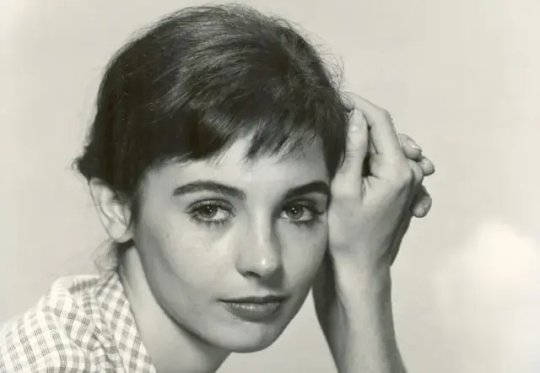

Millie Perkins (87 years old) was born in May 12, 1936 in Passaic, New Jersey. Perkins is now retired from working in film and television besides a modelling career as well. After playing the title role in the 1959 movie "THE DIARY OF ANNE FRANK", "WILD IN THE COUNTRY" (1961) was Millie Perkins's second movie. She was just about Elvis' own age when they worked together. The filming for Wild In The Country took place between November 1960 and January 1961. Millie was a 24-year-old actress and Elvis turned 26 by the time the movie principal photography was finished in January 1961. In a 1990 interview she talked a bit about her impressions on Elvis Presley while working with him in the early 60s:
"Elvis turned out to be someone I liked very much. I felt there was a man with a heart and soul there who truly cared about people. Certainly he treated me as if he cared about me; there was a mutual respect between us. But his life was on a level that my life was not on. I was married to Dean Stockwell at the time, and he was — I felt like he was drifting. The guys were on the set every day, you know, wrestling on the floor. I didn’t even know what girls he was dating at the time, because it didn’t interest me, his personal life seemed so silly. And yet I knew he was a victim of it. I felt like Philip Dunne [Wild In The Country's director] fawned all over Elvis. Elvis’ attitude was — I saw Elvis looking around that set and summing up people faster than anyone else could have, and I felt that after a short period of time he was disappointed in Philip Dunne, but he was too polite and well behaved to say anything.
He tried very hard to make this film better than his other movies, and you saw him trying and asking questions. And I just believe the sad thing is that [the director] did not have the ability to help Elvis through it.
I remember doing this one scene; we were sitting in the truck, and we were supposed to be driving home from a dance or going to a dance, and in the script he was supposed to break into song, turn on the radio and start singing. And to me it was like, "Yuck," I was very young, and I thought, "My sisters are going to tease me, this is so embarrassing and tasteless." You see, I was a snob, too. But — and this was the nicest thing — while we were rehearsing, finally the director walked away, and Elvis looks at me and says, "God, this is so embarrassing. Nobody would ever do this in real life. Why are they making me do this?" So there we were, both of us having to do something and we just wanted to vomit.
He never used his star power — never. Maybe he should have. Maybe he did it on some other level, but he sure didn’t do it on the set. I felt like he was younger than me, this very humble person who would make statements about what he believed in. And I would think, "He’s saying that to show me he’s a fine human being." All I know is that there was a person there with a refined heart and soul, and I say refined on any level you want to look at it. When you meet someone like that, you know they’re there, even if they’re sitting there eating fifteen lollipops — that’s beside the point. That’s just what they’re doing at that time, but that’s not the essence of the person. The essence of Elvis was as fine a person as I’ve ever met; he treated me as well as anyone has ever treated me in this business."
— Millie Perkins (Betty Lee Parsons in Wild In The Country) about working with Elvis Presley. This 1990's interview excerpt was taken from the book in which it was quoted, "Careless Love: The Unmaking of Elvis Presley" by Peter Guralnick (1998).
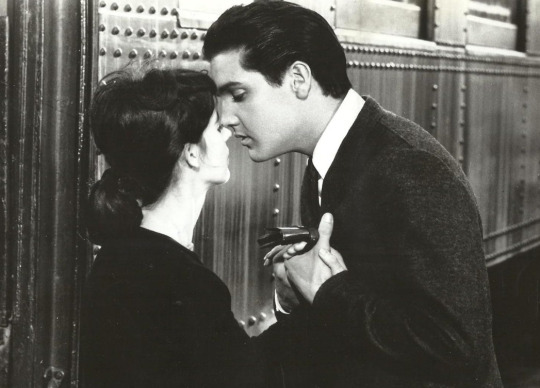
Millie Perkins as Betty Lee Parsons and Elvis Presley as Glenn Tyler in Wild In The Country (1961)
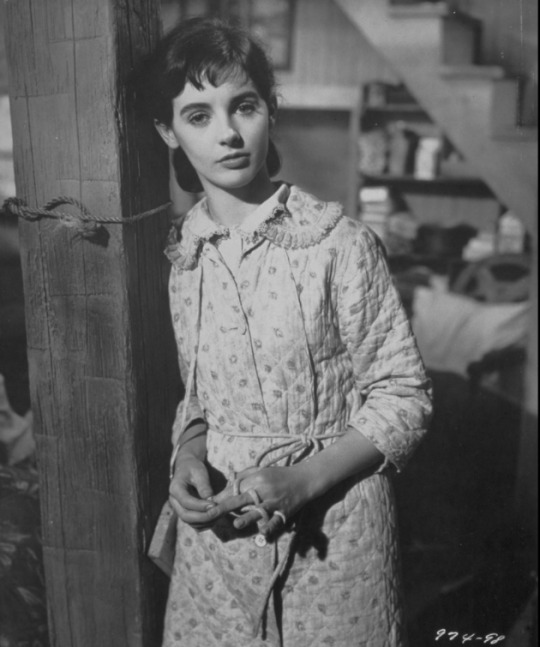
Millie Perkins as Anne Frank in George Stevens' "The Diary of Anne Frank" (1959).
#elvis presley#millie perkins#wild in the country#1961#elvis#60s elvis#elvis the king#elvis fandom#elvis fans#elvis history#elvis movies#elvis movie
95 notes
·
View notes
Photo
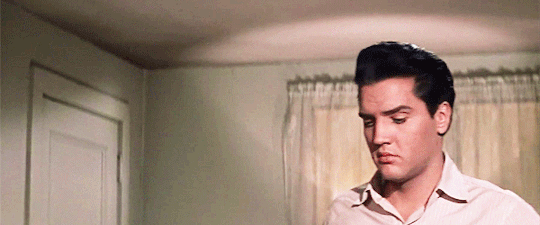

Elvis Presley | Wild in the Country (1961)
#elvis presley#elvis#presleyedit#my gifs#elvis movie#movie gifset#60s#1961#wild in the country#this is probably his most underrated movie#one of my absolute favs#his acting is on point#go watch it guysss
256 notes
·
View notes
Text
Watch Wild in the Country Tomorrow!
Hey kids, grab your popcorn and a bottle of Old Seminole Tonic and join your friends in the Elvis Movie Gang tomorrow to live chat EP's 1961 melodrama Wild in the Country!
Saturday, July 1st at 1 PM PST/ 3 PM CST/ 4 EST/ 9 UK/ 10 EU/ 6 AM Australia
Come here to watch it at Kosmi
Come for the fingers over his lips, stay for the door slam!
youtube
Let me know if you would like to be added to the Elvis Movie Gang taglist, dates are spontaneous and announcements are sometimes made at the last minute. Blame @be-my-ally because I didn't think people were still into this, but I live for a good Elvis movie live chat and will keep organizing them as long as anyone shows up.
@whositmcwhatsit @vintageshanny @missmaywemeetagain @ellie-24 @from-memphis-with-love @powerofelvis @loving-elvis @deke-rivers-1957 @lynettethemadscientist @generoustreemystic @tacozebra051 @prompted-wordsmith @kingdomforapony @lookingforrainbows @ooihcnoiwlerh @ipreferheinousbitch @richardslady121 @elvisabutler @roadtogracelandx45 @dkfixates @eliseinmemphis @amydarcimarie @ab4eva @tarot-sybarite @sillybookmarks @caitlin1996 @ashtag2887 @xenaspace3-blog
#elvis movie gang#elvis presley#livestream and chat an elvis movie with friends#elvis fandom#is the best fandom#wild in the country#1961#Youtube
44 notes
·
View notes
Text

Elvis celebrating his twenty sixth birthday on the set of “Wild In The Country”, 1961.
#happy bday angel 🕊#elvis#elvis presley#elvis history#elvis presley history#elvis photos#elvis presley photos#music history#elvis in the 60s#60s elvis#movie history#old hollywood#wild in the country#the king#king of rock n roll#rock n roll#elvis aaron presley#1960s#1961
135 notes
·
View notes
Text
Wild in the Country Review

As the 2nd 20th Century Fox picture in a row, Elvis was given a second chance to prove his skills as an actor. While this does include songs, it's clear the movie isn't meant to be a comedy. Based on the book, The Lost Country, this film also had some issues with development. The biggest issue that directly impacted the film involved the script. Several scriptwriters were hired/fired before filming had begun. According to the Philip, his main screenplay writer was fired with only half of the script complete. Despite not wanting to take on the task, Dunne ended up having to finish writing it himself. There was also an issue involving the script itself in that test audiences hated the suicide scene in which Ms. Sperry didn't survive, so similar to Love Me Tender the ending had to be re-filmed.
Released before Blue Hawaii was even filmed, this is the last movie made during Elvis' 1st Hollywood phase (acting development). Given the success of GI Blues and the eventual success of Blue Hawaii, this was the last time for several years that Elvis got a serious role. Will the critics be correct by calling this an over reach on Elvis' part, or did Hollywood make a mistake by pulling the plug on his acting dream too soon? Let's find out.

The title song is good and should be an indication of what the tone of the movie will be. There's a somber, sad tone to it which should indicate that this will be a serious, tragic movie. Whether it will have a happy ending or not would be left ambiguous and serves as a hook for the viewers
We get a pretty good set up of story and introduction to all of the characters. Glenn's first session with Ms. Sperry is an amazing showcasing of Elvis' acting. You can feel his connection with Glenn when talking about his deceased mother and what he had to struggle with. So far so good in establishing a connection with your main characters.

We get introduced to one of his love interests in Betty Lee. They're childhood sweethearts and you can tell they still have feelings for each other. "I Slipped, I Stumbled, I Fell" seems to reflect Glenn still holding a torch for her and wanting to break the tension. Did it need to absolutely be in the movie, no. I don't think it's needed to have them driving from one place to another since it doesn't really add anything.
After Glenn gets into a confrontation with Cliff he's told by Ms. Sperry to start journaling his feelings. We also hear how Ms. Sperry can't just help Cliff because she has had relations with his father. She establishes the concept of there being this sense of ethics regarding her ability to counsel individuals.

Despite having feelings for Betty Lee, we find out that Glenn also has feelings of lust for his cousin. He even sings "In My Way" to her and again the song itself is good, I just don't care for how it's used in the context of the movie. Noreen is meant to represent the bad girl, the "forbidden fruit" if you will and we find out that her father wants her to marry Glenn so she can be "an honest woman".
This in combination with the drunk scene is where the film loses me. I don't see a reason for the story to progress along the way that it does. We find out that Glenn knew about his uncle's plan to trap him into marrying Noreen and he still gave into his lust for her by getting drunk. I just don't get it and to me it feels like the story forced it to happen so we can have drama. I understand the conflict of Glenn having to pick between the good girl and the bad girl, but it's executed poorly.

At this point the movie is just dragging through it's story. We get a scene of Glenn having to resist Noreen again before he runs off with Ms. Sperry in trying to get him into college somewhere. They're on their way home and sing "Husky Dusky Day". This song has no reason to be here and is just filler. I get that it's meant to establish a chemistry but this is a therapist and her patient. There shouldn't be any chemistry between them based on what she said earlier.
I know it seems like I'm skipping over a lot of movie, but it's because I have nothing to say. At this point in the movie I know where the story is going and I no longer feel engaged enough to feel anymore connected with the characters.

I know this will be controversial but I did not like this scene. Acting wise yes this is some of Elvis' best work. The problem's that the actual context of the scene rubs me the wrong way. I understand that this type of relationship does happen but as Ms. Sperry tries to explain to Glenn and has explained earlier in the film, it isn't ethical.
While this is a relationship between two adults, it's still unethical for a therapist to be doing this with her patient. Which she knows and did it anyway. When an otherwise mature, intellectual character makes a decision that they knew was bad from the start, I no longer see them as a genuinely flawed character. It feels forced in that because this is a "drama" we need to have tension. It makes sense for these feelings to exist on Glenn's side. I don't blame him for having such feelings as it feels in character for him to cling onto someone who feels stable enough. My problem is that Ms. Sperry likes him back and has this huge struggle to not "give into her lust". I don't get it and I don't think I ever will get it. It leaves me feeling turned off and disconnected.

This scene in particular is an example of feeling disconnected from the characters. I don't feel bad for Ms. Sperry willingly doing something she knew was wrong. While I do agree that the town went too far in assuming the extent of their relationship, she also very well knew that there was an element of truth to it. Yes she didn't outright sleep with Glenn but she would be an outright liar if she said she didn't return his feelings in any way. She threw away her own sense of ethics her job requires and she discredited herself because of it. I know test audiences didn't like the original ending because they thought it was too tragic, but the original ending would've been way better given the tone of the movie. This is meant to be a serious film where characters face consequences for their actions regardless of the extent of their crime. What would make for a beautifully tragic end but to have a woman to commit suicide because the entire town believes in a complete lie? Glenn feeling guilty for what happened decides to continue his progress and fulfill his mother's dream of going to college.
Am I being cold and overly judgmental? Probably, but when you have characters you just don't feel any sense of sympathy towards there isn't anything else you can say outside of question their decisions. The writers didn't have any idea on how to make what their predecessor wrote mesh together. It very much shows here as I felt that the story was completely disjointed and quite frankly boring as some scenes either didn't need to exist or went on too long.

I'm sorry to say this but this movie just didn't vibe with me at all. Glenn's character arc was sloppy and I wasn't able to fall in love with any of the characters. The songs were good on their own but outside of the intro it dragged the film. That to me is the biggest failure of the movie: the story wasn't engaging enough to justify its length. Given what I shared above about the background of the movie, this felt like a movie that was thrown together with no solid vision. The writer's didn't know where they were going with the story but they had to put something together despite it not being they're best work.
Therefore I'm giving this film a 7/10. It's not necessarily bad, but I found myself feeling disappointed. This story was just way to messy and didn't pass my vibe test. However, I think if you're able to get past the issues I brought up, this would be an enjoyably different Elvis experience.
AN: Thank you to @xanatenshi and the people who voted for this movie. Sorry if anyone who reads this feels like this was a let down. I genuinely hope to put out a better review next month.
Tagging: @arrolyn1114, @thedaisymaisy, @that-hotdog, @peaceloveelvis, @imaginationlast, @fuzzymusic94, @helen06dreamer, @sfull12345, @alittlemoreelvis, @lynettethemadscientist, @motht-eeth, @ash-omalley, @spooky-hazex, @teamnefarious, @blighted-star, @ab4eva, @oh-my-front-door, @father-of-2cats, @stormie-ryan23, @yksuwyksud, @tacozebra051, @alienelvisobsession, @vintageoldsoul, @ohmygiddd, @lovininapinkcadillac, @stephthestallion, @mistyspresley, @bisexualwvtson, @ahundredlifetime, @karel-in-wonderland, @elvispresleywife, @georgefairbrother, @moonchild-daniella, @musiclover712, @worldofyns, @sillybookmarks, @g00d2balive, @leighpc, @generoustreemystic, @peskybedtime, @thetaoofzoe, @renegadewarrior, @vintagepresley, @tupelomiss, @myradiaz, @pinkcaddyconfessions, @kiankiwi, @presley72elvis, @delulubutidontcare, @januarypresley1969, @livelaughelvis, @all-hookedup-on-elvis, @slayingjd, @ilivebecauseiamforced, @dusintv, @cattcb, @jaqueline19997, @richardslady121, @iloveelvis2, @lett-them-eatt-cake, @if-i-can-dream-of-elvis, and @lookingforrainbows.
9 notes
·
View notes
Text
hello all you beautiful people!
a little unknown fact about me: i love reading! i mainly read reference material and nonfiction, but i don't mind the occasional fiction! i have plenty of friends on here who like reading (after all, you're on my page!) and who love elvis, so i figured i'd make a compendium of books that were adapted into elvis' movies.
it will be organized by the movie / the year it came out, and the story / its author. i'll also include a little description of each.

-love me tender (1956) & the story of the reno gang: this movie was not based on a story, but actual historical events! the reno gang were a group of brothers who went around the midwest robbing trains. clinton reno was a real person, the youngest of the five brothers (his nickname was "honest", as he never got involved with any criminal activity pertaining to his brothers.)
-loving you (1957) & a call from mitch miller by mary agnes thompson: the movie was based on a short story by mary agnes thompson that was featured in the june 1956 edition of good housekeeping.
-king creole (1958) & a stone for danny fisher by harold robbins: king creole was the first of el's movies to be based on an entire book! the role was originally meant for james dean, and was set in the backstreets of new york city.
-flaming star (1960) & flaming lance by clair huffaker: this was one of two movies where the original author was involved in creating the screenplay.
-wild in the country (1961) & the lost country by j.r. salamanca: although some creative liberties were taken (el's character went from an artist to a writer and hope lange's character became a psychiatrist rather than a teacher), it still followed the same plot as the original novel. it was also the first to feature elvis on a published paperback.
-follow that dream (1962) & pioneer, go home! by richard p. powell: the novel is based on a family from new jersey (WOOT WOOT), and although technically based on the book, the movie takes many creative liberties to the point of it being almost completely opposite the original source material.
-stay away, joe (1968) & stay away, joe by dan cushman: this is what el considered his first "serious" role. although involving some incredibly racist stereotypes, it is rooted in some truth about elvis' lineage: his great-great-great grandmother was a cherokee woman named morning white dove, and some attribute his high cheekbones and striking features to his distant native ancestry.
-live a little, love a little (1968) & kiss my firm but pliant lips by dan greenburg: the movie, like follow that dream, was so loosely based on the book that it was almost completely opposite the original source material.
-charro! (1969) & charro! by harry whittington: this is the only "officially endorsed" book based on an elvis movie.
-the trouble with girls (1969) & chautauqua by day keene: this is my absolute favorite movie of all time, and ironically, there is no information about the book's plot. based on what i've gathered from other sources, it follows an almost identical plot to the movie. unfortunately, the author died 9 months prior to the movie's release.
-change of habit (1969) & title-not-available by richard morris and john joseph: according to wikipedia, change of habit was based on a story written by richard morris and john joseph. i've scoured the internet under both of those names, and found nothing! oh well.
i hope you all had as much fun reading this as i did writing this, and be sure to shoot me a message if you read any of these!
(...or if you find a reasonably priced copy of chautauqua.)
-all my love, calla xx @kiankiwi @arianatheangel-girl @mooodyblue
#elvis presley#elvis books#elvis cinematic universe#love me tender (1956)#loving you (1957)#king creole (1958)#flaming staar (1960)#wild in the country (1961)#follow that dream (1962)#stay away joe (1968)#live a little love a little (1968)#charro! (1969)#the trouble with girls (1969)#change of habit (1969)
13 notes
·
View notes
Text
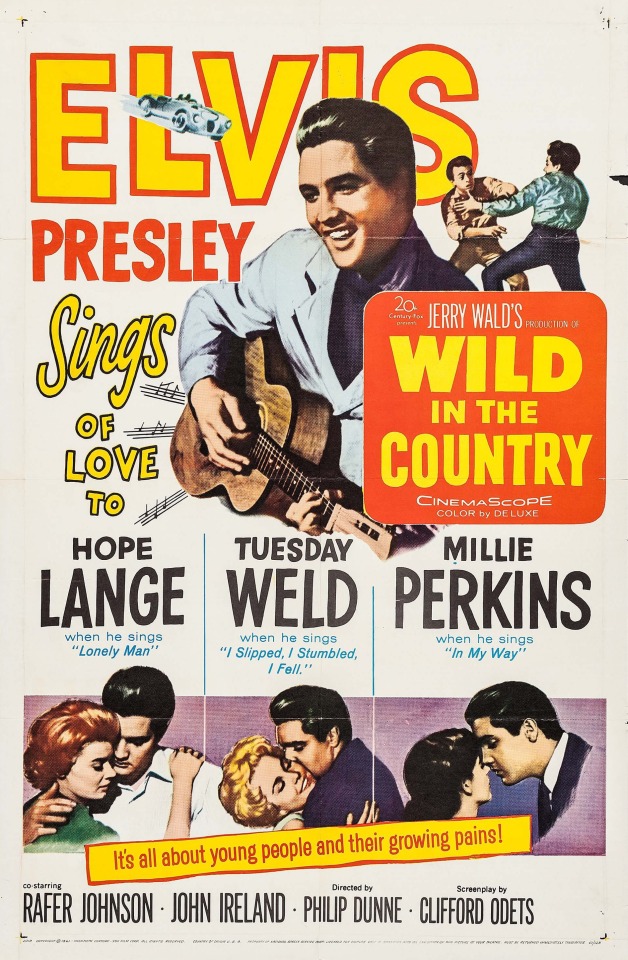
#Wild in the Country#Elvis Presley#Hope Lange#Tuesday Weld#Millie Perkins#Rafer Johnson#john ireland#Philip Dunne#1961
2 notes
·
View notes
Text
A Quick History of BL
As someone who wrote a thesis on this very subject a few years ago, here is the short version of how BL has evolved throughout the years. For the new comers ❤
a minute of silence for the original form of this post that tumblr decied to not save right after I saved it
I am going to go with a chronological approach. Unfortunately, I cannot put everything in one post so if there’s any questions about this or that aspect of the history of BL that you want to know and it’s not talked about here, you are welcome to ask me directly :)
Context and influences - Japan in the 60′s
Before the US forced Japan to open its borders to the outside world in the 1800s, homosexual practices were common place between budist monks, samurais and kabuki actors. During the Edo period (1600s to 1800s) there was a very rich amount of poetry, art, books (such as Nanshoku Okagami (The Great Mirror of Male Love) by Ihara Saikaku) and codes of conduct about how to have a good master/aprentice relationship, kinda like the greeks if you know what I mean. However, with the arrival of western influences, in order to become a more “civilized” country, it was all put in the closet.
Yet, in the 60′s Japan started to pick it up again through literature about young androginous beautiful boys (aka bishounen). On one hand, in 1961, the novel Koibitotachi no Mori (A Lover’s Forest) by Mari Mori was published. It tells the story of a young and beautiful 19 year old worker and a half french half japanese aristocrat, and their tragic romance. On the other hand, Taruho Inagaki wrote Shounen ai no Bigaku (The esthetics of boy-love), an essay on aesthetic eroticism (of which he wrote a lot of). All this was know as Tanbi (lit. aesthetic) literature. It generally refered to literature with implied homosexuality and homoeroticism such as works by Oscar Wilde, Jean Cocteau, etc. And of course, Mori and Inagaki.
In chinese tanbi is read as danmei (term used to refer to BL novels in china today, ie: The Untamed it’s all connected friends).
From the birth of Shonen Ai to Yaoi - 70′s to the late 80′s
Around the beginning of the 70′s, shoujo was being revolutionized by the Year 24 Group, a generation of women manga authors (mangaka) who started to explore new themes. Among them, their interest in tanbi gave birth to a new subgenre: Shounen ai.
Their most known manga were:
Kaze to Ki no Uta (The Ballad of the Wind and Trees) by Keiko Takemiya, and
Toma no Shinzo (The Heart of Thomas) by Moto Hagio
Their stories are characterized by having suffering eurpoean bishounen in boarding schools, living an idealized perfect love (meaning passionate) that, despite the tragic end of one of them, lives forever in the other.
As this genre starts getting popular, more and more fans of these stories start making their own self published manga, aka doujinshi, of the genre. It is around this time that the term Yaoi is coined. Meaning “YAma nashi, Ochi nashi, Imi nashi” (no climax, no fall, no meaning). Basically PWP fanfiction, for the most part. Doujinshis could be considered an equivalent of fanfiction in manga form. It is also here that the term Fujoshi (aka Rotten Girl, for liking rotten things) starts being used to refer to women readers of yaoi.
With this rise in popularity come the start of the commercialization of the genre. Which meant the publication of magazines dedicated solely to yaoi/shonen ai/BL. The most popular yaoi manga magazine at the time was June. The common trait of their stories being the therapeutic power of the love between the mains. The traumatized character would heal throught this newfound love.
Most of the stories at this time happened in the West (Europe or the States) as the exploration of these dark themes intertwined with homosexual romance and homoeroticism still feel safer to explore as a foreign concept. One example would be Banana Fish (1985).
Commercialization and Yaoi Ronso - 90′s
As more publishing houses pick the genre up, the term Boys Love is used to include every type of manga about homosexuality made for women.
The increasing amount of BL series sees a changes in its themes:
the start of the “gay for you” trope where one mantains their heterosexuality despite being in a homsexual relationship,
the uke/seme dynamic (mirroring hetero realtionships) also relating to physical appearence (one being more feminine, the other being more masculine),
the use of rape as an act love (sexual violence has always been present but here it becomes a staple),
anal sex as the only type of sex,
older and more masculine men start to appear
they now happen in Japan
Good examples of the presence of these themes in manga are Gravitation (1996) or Yatteranneeze (1995).
However in 1992, Masaki Sato (a gay activist/drag queen) wrote a letter in a small scale feminist magazine attacking yaoi and pointing out how it “represented a kind of misappropriation or distortion of gay life that impacted negatively upon Japanese gay men”. The female readers of yaoi responded, defending the genre as a means to escape gender roles and explore sexual themes that was never meant to represent the realities of gay men. This is know as the Yaoi Ronso (Yaoi Debates).
The debate ended with both sides understanding more of each other, with mangakas starting to include queer views in their works. It also started the academic reasearch of BL.
Yet, it is a debate that has been restarted more than once, as it is still relevant despite the evolution of the genre.
more on this on another post
Globalization and coining of BL - 2000′s
By the beginning of the 2000s BL is being sold all over the world (like all manga), and has become a stable industry. We could say it has finally become it’s own genre.
Some of the most well known manga series, to us (in the west), of the time are:
Junjou Romantica 2002
Koi Suru Boukun 2004
Love Pistols 2004
Haru wo Daiteita 1999
all of these have anime adaptations for the curious ones
We also start seeing short anime adaptations or special episodes of the most popular series, with questionable themes, such as: adoptive father x adoptive son (Papa to Kiss in the Dark 2005), father x son’s friend (Kirepapa 2008), etc...
However the themes remain more or less the same. Junjou Romantica’s love story starts with a non-con sex scene by the older one (masc, seme) to the younger one (more feminine, uke) addressed years later in the manga btw. Koi Suru Boukun’s love story is triggered by aphrodisiacs and rape. They’re still very present in the stories but slowly going away. A mangaka that represents this era could be Natsume Isaku (Candy Color Paradox 2010).
Change is slow in Japan. Even though the voices of LGBT+ people started to be taken into account in the genre it is not until later that we see it reflect in the mangas themselves. However, we can already see the start of this in Doukyusei (Classmates) (2006) by Asumiko Nakamura. Also Kinou Nani Tabeta? (2007) which is actually part of a more mature genre: Seinen.
It is my personal (subjective) theory that the BL of this era was the one that got popular outside of Japan, which is why we see lots of references to the themes, tropes and dynamics of this time in today’s BL series.
The LGBTzation of BL and the rise of webtoons - 2010′s to 2020′s
Slowly but surely LGBT characters and themes enter the scene of BL. Existing simultaneously with the previous tropes and themes, we start seeing a shift in these stories. We now see:
characters that identify as gay or some type of queer
discussions about homophobia
more mature themes about life and romance
At the same time as we get the usual love stories with the usual themes, a new trend starts to take over. And we get simultaneously, cute, sometimes questionable but light love stories:
Love Stage 2010
Ashita wa Docchi da! 2011
Kieta Hatsukoi 2019
More profound stories and darker or more complex themes:
Blue Sky Complex 2013
Saezuru Tori wa Habatakanai 2011 (mafias)
Given 2013 (suicide)
Hidamari ga Kikoeru 2013 (deafness)
And others that adress the queer experience in a more mature way (which might actually fall into the Seinen genre)
Itoshi no Nekokke 2010 (slice of life, queer characters)
Smells like Green Spirit 2011 (two ways to deal with a homphobic society)
Strange 2014 (relationships between men)
Shimanami Tasogare 2015 (an LGBT group helps a closeted gay)
Old Fashioned Cupcake 2019 (you know this one 😉)
Bokura no Micro na Shuumatsu 2020 (the end of the world)
As queer stories are explored, BL mangakas and mangakas from other genres start to consider more stories about queer people such as the Josei Genderless Danshi ni Aisaretemasu (My Androgynous Boyfriend) (2018) by Tamekou, or the Shoujo Goukon ni Itarra Onna ga Inakatta Hanashi (The story of when I went to a mixer and there were no women) (2021) by Nana Aokawa.
Still, we can see two realities live side by side. Doukyuusei gets adapted into an impactful animated movie in 2016, meanwhile Banana Fish gets an anime adaptation that keeps the homoeroticism but not the homosexuality.
For those who might be interested. Here are some of the authors that represent the first half of this era, where they start to include newer points of view:
Scarlet Beriko, HAYAKAWA Nojiko, KURAHASHI Tomo, OGERETSU Tanaka, Harada, KII Kanna (Stranger by the Sea), etc...
And authors that while keeping classical themes break the stereotypes in a subtle manner:
CTK, ZAKK, Jyanome, Cocomi, Hidebu Takahashi, SUZUMARU Minta, etc...
Mangakas also no longer stick to one genre only. They explore whichever of them they want, from BL to Seinen to others.
ie: Tamekou,
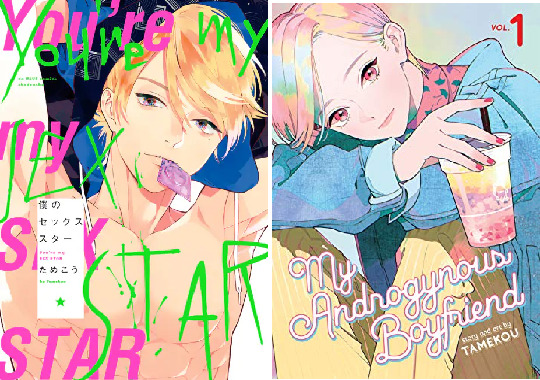
or Asumiko Nakamura

The curious case of Webtoons
With the digitalization of mangas, throught Renta and Lehzin, it has become easier (and more expensive) to access these stories. Korea makes and appearence with their webtoons. Through the lack of piracy protections and the majority of them being digital, manhwa (korean webtoons) sees a rise in popularity. Through the digital medium the influencee can be the influencer.
However, like many other East Asian countries they have consumed BL, without hearing about the conversations about BL. So they end up mantaining the older themes and stereotypes that newer BL is trying to leave behind. Therefore, we end up with a mix of old and new, ie:
Killing Stalking 2016
Cherry Blossoms After Winter 2017
Painter of The Night 2019
Additionally, it is also thanks to the easy access to internet that Omegaverse, with its higher dramatic stakes (that parallel hetero dynamics), enters the mangasphere in 2016. It has grown in popularity ever since.
With the Thai BL Boom of 2020, Japan rediscovers its own BL market and starts investing in it more. Which is why we get live action adaptations of BL manga that was popular years ago (Candy Color Paradox was a manga from 2010), the more recent ones (The End of the World With You) or new anime adaptations (Saezuru Tori wa Habatakanai in 2020).
more on this in my japanese live action BL post
What has it become now? is it BL? ML? or Seinen? Or is it all just gay manga?
It is clear that Shoujo manga (with BL, Josei and Seinen) is exploring queer themes such as gender and sexuality more and more. Japan is interested in this conversation, not only in manga (Genderless fashion). Which brings up the current question in BL studies: Does it make sense to keep these categories?
As a response to BL, ML (Male Love), which is made by gay men for gay men, started happening (around the 70s too). And Bara (gay manga porn) in response to Yaoi. However both gay men and women read BL and ML. We also see other themes being explored through BL, such as friendship (in BL Metamorphose), food (in Kinou Nani Tabeta), male relationships of all kinds (in Strange), and different queer views on life and its challenges (in Shimanami Tasogare). More and more what is LGBT and what is BL is merging, the line is blurred.
Conclusion
BL has been in my life for longer than it hasn't. It is through shoujo and BL that I have come to understand people and romance.
It is flawed, like everything else this life, but it's flourishing in many ways.
The genre feels old and new at the same time.
We can still find shounen ai/tanbi elements in more modern manga (All About J). Or the gay for you in a new light (Itoshi no Nekkoke). Or more educational manga on queer issues (My Brother’s Husband by Gengoroh Tagame). BL has around 50 years of existence but it is also being born anew in Thailand and Korea.
BL manga will continue to evolve in acordance to Japanese tastes, as it is still a local market. Hopefully the korean webtoons that get popular will be the more daring ones in their themes. Who knows where it will go from here? The only thing we know for sure is that it will continue to change. Isn't it exciting?
A post on the evolution of live action BL in Japan is coming, to complement this post. As well as a more detailed explanation of the Yaoi Debates and gay manga.
#history of bl#bl post series#I feel like I left too much stuff out#I hope it makes sense#honestly I would really recommend reading some of those manga#they're super interesting#soon it'll be 20 years since I started reading BL#my gosh#if theres anything anyone wants to know more about#I'd love to write more :)#yaoi manga#bl manga
714 notes
·
View notes
Text

Elvis Presley and Hope Lange in WILD IN THE COUNTRY (1961), directed by Philip Dunne
42 notes
·
View notes
Photo



Elvis Presley and Hope Lange in “Wild in the Country” (1961)
#elvis#elvis presley#elvis aaron presley#elvis gifs#60s elvis#elvis 2022#austin butler#gifs#gifset#vintage#old movies#cinemaspast#loving you#love me tender#king creole#jailhouse rock#gi blues#flaming star#follow that dream#wild in the country#girls! girls! girls!#kid galahad#it happened at the world's fair#blue hawaii#fun in acapulco#kissin cousins#viva las vegas#68 comeback special#50s movies#60s movies
431 notes
·
View notes
Text
Arnold Schwarzenegger, MAR 17, 2022
Full transcript below the cut
Hello everybody, and thank you for sharing your time with me. I'm sending this message through various different channels to reach my dear Russian friends, and the Russian soldiers serving in Ukraine.
I'm speaking to you today because there are things that are going on in the world that are being kept from you—terrible things that you should know about. But before I talk about the harsh realities, let me just talk about the Russian who became my hero.
In 1961 when I was 14 years-old, a very good friend of mine invited me to come to Vienna to watch the World Weightlifting Championship. I was in the audience when Yuri Petrovich Vlasov won the World Championship title, becoming the first human being to lift 200 kilograms over his head. And somehow a friend of mine got me backstage.
All of a sudden, there I was, a 14-year-old boy standing in front of the strongest man in the world. I couldn't believe it. He reached out to shake my hand—I mean, I still had a boy's hand. He had this powerful man's hand that swallowed mine, but he was kind, and he smiled at me. I will never forget that day. Never.
I went home and I put his photo above my bed to inspire me when I started lifting weights. My father told me to take down that picture and to find a German or an Austrian hero. He got really angry, and we argued back and forth.
He didn't like Russians, because of his experience in the second World War. You see, he was injured at Leningrad, where the Nazi army that he was part of did vicious harm to the great city and to its brave people. But I did not take the photograph down, no. Because it didn't matter to me what flag Yuri Vlasov carried.
My connections to Russia didn't stop there, by the way. Oh, it actually deepened when I traveled there, with bodybuilding and for my movies and met all my Russian fans.
And then one of those trips I remember I met Yuri Vlasov once again. It was in Moscow during the filming of Red Heat, which was the first American movie allowed to film in Red Square. Now, he and I spent the day together. He was so thoughtful, so kind, and so smart. And, of course, very giving. He gave me this beautiful, blue coffee cup. And ever since then I've been drinking my coffee out of it every morning.
Now, the reason why I'm telling you all of those things is that ever since I was 14 years old, I've had nothing but affections and respect for the people of Russia. The strength and the heart of the Russian people have always inspired me.
And that is why I hope that you will let me tell you the truth about the war in the Ukraine and what is happening there.
No one likes to hear something critical of their government. I understand that. But, as a longtime friend of the Russian people, I hope that you will hear what I have to say. And may I remind you that I speak with the same heartfelt concern as I spoke to the American people when there was an attempted insurrection on January sixth last year, when a wild crowd was storming the U.S. Capital, trying to overthrow our government.
You see, there are moments like this that are so wrong, and then we have to speak up. This is exactly the same with your government. I know that your government has told you that this is a war to denazify Ukraine. Denazify Ukraine? This is not true! Ukraine is a country with a Jewish president. A Jewish president, I might add, whose father's three brothers were all murdered by the Nazis.
You see, Ukraine did not start this war. Neither did nationalists or Nazis. Those in power in the Kremlin started this war. This is not the Russian people's war. No. As a matter of fact, let me tell you, what you should know is that 141 nations at the U.N. voted that Russia was the aggressor. They called for it to remove its troops immediately.
Only four countries in the entire world voted with Russia. That is a fact. See, the world has turned against Russia because of its actions in the Ukraine. Whole city blocks have been flattened by Russian artillery and bombs, including a children's hospital and a maternity ward. Three million Ukrainian refugees—mainly women, children, and the elderly—fled their country, and many more are trying to seek to get out.
It is a humanitarian crisis. Because of its brutality, Russia is now isolated from the society of nations.
You're also not being told the truth about the consequences of this war on Russia itself. I regret to tell you that thousands of Russian soldiers have been killed. They have been caught between the Ukrainians fighting for their homeland and the Russian leadership fighting for conquest.
Massive amounts of Russian equipment have been destroyed or abandoned. The destruction that Russian bombs are raining down upon innocent civilians has so outraged the world that the strongest global economic sanctions ever taken have been imposed on your country. Those who don't deserve it on both sides of the war will suffer.
The Russian government has lied, not only to the citizens, but to its soldiers. Some of the soldiers were told they were going to fight Nazis. Some were told that the Ukrainian people would greet them like heroes. And some were told that they were simply going on exercises—they didn't even know that they were going into war. And some were told that they were there to protect ethnic Russians in Ukraine. None of this is true.
The fact is that Russian soldiers have faced fierce resistance from the Ukrainians who want to protect their families and their country. When I see babies being pulled out of ruins, I think that I am watching a documentary about the horrors of the Second World War, not the the news of today.
Now let me tell you, when my father arrived in Leningrad, he was all pumped up on the lies of his government. And when he left Leningrad, he was broken, physically and mentally. He lived the rest of his life in pain. Pain from a broken back, pain from the shrapnel that always reminded him of those terrible years. And pain from the guilt that he felt.
To the Russian soldiers listening to this broadcast, you already know much of the truth that I've been speaking. You have seen it with your own eyes. I don't want you to be broken like my father. This is not the war to defend Russia that your grandfathers or your great-grandfathers fought. This is an illegal war.
Your lives, your limbs, your futures, are being sacrificed for a senseless war condemned by the entire world.
Now, to those in power in the Kremlin, let me just ask you: Why would you sacrifice those young men for your own ambitions?
To the soldiers who are listening to this, remember that 11 million Russians have family connections to Ukraine. So every bullet you shoot, you shoot a brother or a sister. Every bomb or every shell that falls, is falling not on an enemy but on a school, or a hospital, or a home. I know that the Russian people are not aware that such things are happening.
So I urge the Russian people and the Russian soldiers in Ukraine to understand the propaganda and the disinformation that you are being told. I ask you to help me spread the truth. Let your fellow Russians know the human catastrophe that is happening in Ukraine.
And to President Putin, I say: You started this war. You are leading this war. You can stop this war.
Now let me close with a message to all of the Russians who have been protesting in the streets against the invasion of Ukraine: The world has seen your bravery. We know that you have suffered the consequences of your courage. You have been arrested. You have been jailed. And you have been beaten. You are my new heroes.
You have the strength of Yuri Petrovich Vlasov. You have the true heart of Russia. My dear Russian friends, may God bless you all.
(source)
33 notes
·
View notes
Text
Troll Trilogy by Katherine Langrish (2004-2007)
A secret kingdom of trolls, and their legendary gold, lies in the mysterious shadows of Troll Fell. It is to this eerie and dangerous place that Peer must go after his father's sudden death, to live with his greedy uncles, Baldur and Grim, at their mill. When Peer discovers his uncles' plan to sell children to the trolls, he has to bury his fears and set out to stop them somehow. In a world filled with magic and mystery, Peer has only his bravery, his wits, and two new allies -- a daring girl looking for adventure and a mischievous house spirit looking for a good meal. Their story will become part of the legends and lore that fill this extraordinary land by the sea.
The People by Zenna Henderson (1961-1966)
These are the People.
Marooned on this planet by the crash of their interstellar vehicle in the distant past, The People are never free of a sense of strangeness in this world and a yearning for the home they have half-forgotten.
These are the chronicles of their arrival on this world, their estrangement from it, and their ultimate acceptance of their poignant exile.
The Clockwork Crow by Catherine Fisher (2018-2020)
Orphan Seren Rhys is on her way to a new life at the remote country mansion of Plas-y Fran when she is given a package by a stranger late at night in an empty train station. The package contains a crotchety, mechanical talking crow, which Seren reluctantly brings to her new home. But when she gets there, the happy Christmas she had hoped for turns out to be an illusion--the young son of the house, Tomos, has been missing for almost a year, rumored to have been taken by the fairies. With the Crow's reluctant help and a little winter magic, Seren sets off on a perilous journey to bring Tomos home. An enthralling story of family and belonging set in frost-bound Victorian Wales.
Fairytales for Wilde Girls by Allyse Near (2013)
There's a dead girl in a birdcage in the woods. That's not unusual. Isola Wilde sees a lot of things other people don't. But when the girl appears at Isola's window, her every word a threat, Isola needs help.
Her real-life friends – Grape, James and new boy Edgar – make her forget for a while. And her brother-princes – the mermaids, faeries and magical creatures seemingly lifted from the pages of the French fairytales Isola idolises – will protect her with all the fierce love they possess.
It may not be enough.
Isola needs to uncover the truth behind the dead girl's demise and appease her enraged spirit, before the ghost steals Isola's last breath.
The New Moon's Arms by Nalo Hopkinson (2007)
Calamity, born Chastity, has renamed herself in a way she feels is most fitting. She's a 50-something grandmother whose mother disappeared when she was a teenager and whose father has just passed away as she begins menopause. With this physical change of life comes a return of a special power for finding lost things, something she hasn't been able to do since childhood. A little tingling in the hands then a massive hotflash, and suddenly objects, even whole buildings, lost to her since childhood begin showing up around Calamity. One of the lost things Calamity recovers is a small boy who washes up on the shore outside her house after a rainstorm. She takes this bruised but cheerful 3-year-old under her wing and grows attached to him, a process that awakens all the old memories, frustrations and mysteries around her own mother and father. She'll learn that this young boy's family is the most unusual group she's ever encountered--and they want their son back.
Finisterre by C. J. Cherryh (1995-1996)
Stranded on a distant planet that abounds with fertile farmland, human colonists appear to be in paradise. But all the native animals communicate by telepathy, projecting images that drive humans mad. Only Nighthorses stand between civilization and madness. When a flare of human emotion spreads to all the horses, chaos erupts.
Three Kings by Freydis Moon (2022)
Ethan Shaw—lighthouse keeper and local witch—lives a charmed life in his chilly, coastal hometown. Blessed with a flourishing garden and a stable livelihood, Ethan can’t complain. But when his husband, Captain Peter Vásquez, brings home a wounded leopard seal after an impromptu storm, Ethan is faced with a curious situation: caring for a lost selkie named Nico Locke.
As Ethan struggles with the possibility of being infertile, insecurities surrounding his marriage, and a newly formed magical bond with a hostile, handsome selkie, his comfortable life begins to fracture. But could breakage lead to something better?
With autumn at their heels and winter on the horizon, Ethan, Peter, and Nico test the boundaries of a new relationship, shared intimacy, and the chance at a future together.
Silver Sequence by Cliff McNish (2003-2005)
Six children leave home and are drawn to Coldharbour - an eerie wasteland of wind, rats, gulls and rubbish. Each of them has a unique gift, but they must learn to use their skills fast. Drawing ever closer in a maelstrom of fury is the Roar, something vast and dreadful that wants to destroy them.
Lilah's Adventures by Sherwood Smith (2012)
When twelve-year-old Lady Lilah decides to disguise herself and sneak out of the palace one night, she has more of an adventure than she expected--for she learns very quickly that the country is on the edge of revolution. When she sneaks back in, she learns something even more surprising: her older brother Peitar is one of the forces behind it all. The revolution happens before all of his plans are in place, and brings unexpected chaos and violence. Lilah and her friends, leaving their old lives behind, are determined to help however they can. But what can four kids do? Become spies, of course!
The Merlin Spiral by Robert Treskillard (2013-2014)
When a meteorite crashes near a small village in fifth-century Britain, it brings with it a mysterious black stone that bewitches anyone who comes in contact with its glow--a power the druids hope to use to destroy King Uthur's kingdom, as well as the new Christian faith. The only person who seems immune is a young, shy, half-blind swordsmith's son named Merlin.
As his family, village, and even the young Arthur, are placed in danger, Merlin must face his fears and his blindness to take hold of the role God ordained for him. But when he is surrounded by adversaries, armed only by a sword he's named Excalibur, how will he save the girl he cherishes and rid Britain of this deadly evil ... without losing his life?
#best fantasy book#poll#troll trilogy#the people#the clockwork crow#fairytales for wilde girls#the new moon's arms#finisterre#three kings#silver sequence#lilah's adventures#the merlin spiral
15 notes
·
View notes
Text

Millie Perkins-Elvis Presley "El indómito" (Wild in the country) 1961, de Philip Dunne.
10 notes
·
View notes
Text


Elvis and The Colonel on set of Wild in The Country, 1961.
#elvis#elvis presley#elvis history#elvis presley history#elvis photos#elvis presley photos#music history#movie history#wild in the country#elvis in the 60s#60s elvis#king of rock n roll#elvis aaron presley#1960s#1961
39 notes
·
View notes
Text
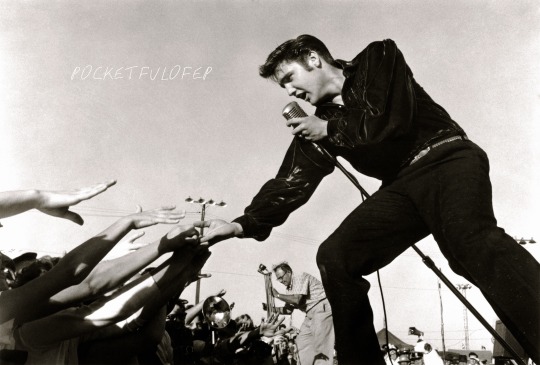
Elvis: one man, a thousand voices. 🎙
Have you ever paid attention to how much Elvis’ voice changes over the years? 🤓
“Elvis’s voice changed almost on a yearly basis, and I’m not sure anyone has ever come up with the real reason why this was. If we listen to Sinatra, we can say, ‘that’s the 50s,’ or ‘that’s the 70s.’ With Elvis, we can say, ‘that’s 1961’ or ‘that’s 1976’.
Elvis’s voice of 1953 doesn’t sound much like the voice of 1956 (compare the ballad singing, for example). 1960 doesn’t sound much like 1956. And those sweet vocals of the early 1960s really take hold in late 1960s (“His Hand in Mine”, “Wild in the Country” sessions). Those sweet vocals start to disappear in 1963.
By 1965, we have a weird thick, almost unhealthy sounding vocal. That’s gone by 1966, where we get a fuller, darker, deeper sound. The TV show from 1968 through the live recordings of 1960 bring us the edgier, raw sound. That starts to disappear as early as February 1970, and the ‘70s’ voice starts to appear as the year carries on.
1971 brings a weaker sound with more vibrato, but that’s gone by the November 1971 tour. 1972 has Elvis in fuller voice, with powerful vocals - much better than the year before. ‘Aloha’ returns us to the weaker voice heard in 1972, but by the end of 1973 he’s in better voice again - but still not sounding the same as 1972.
1974 sees him with more power again, as does most of 1975. 1976 is so full of ups and downs that you can almost pinpoint the tour, let alone the year. October 1976 finds him in much better voice than February or June, for example. […]
His voice matures and changes when in the army, and again between 1965 and 1966 - both times when we know he was making much music at home and recording himself on his own equipment there. He was trying out new material, new styles, and even trying to expand his range.” (Steve Hoffman)
*
#elvispresley #presley #theking #graceland #elvis #smile #love #idol #music #iconic #vintage #style #classy #vintagefashion #kingofmusic #rockandroll #sideburns #blessedsoul #rip #elvisthepelvis #memphis #tupelo #soldier #elvislegacy #epe #istandwithelvis
14 notes
·
View notes
Text
Glenn Tyler's Rank
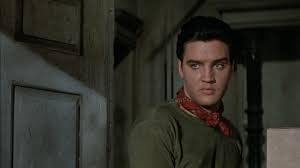
Disclaimer: For my tier list I’m basing this off of a one on one fight with no weapons and no outside interference. If a character has to rely on a weapon they’re ranked lower. If a character has to fight more than one person at a time, I’d look at it on a case by case basis. Age, size and general background are factors that will be taken into consideration. Since a lot of those details are going to be up to interpretation as these are characters and not real people, feel free to share your own thoughts.
------------------------------------------------------------------------------
Wild in the Country seems to take place in "contemporary" 1960/1961. Glenn is a young man who goes from job to job because he keeps getting in trouble with the law. Glenn's age seems to differ based on the source so I'll say he's at most 25 years old.
Glenn's fights are interesting in that we only get 2 fight scenes. I don't count him getting aggressive with Cliff earlier in the movie and him pushing Uncle Rolfe as fights.
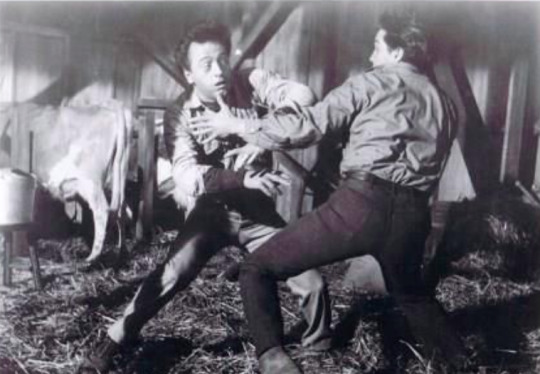
The fight that started everything occurs between Glenn and his own brother. We don't know how old his brother is, but we can assume they're about the same age. While Glenn does beat him, the one drawback is that his brother was drunk. Alcohol can totally change how a person fights so we have no idea if his brother was at his 100%. But since he still won without needing a weapon, that boosts his case.
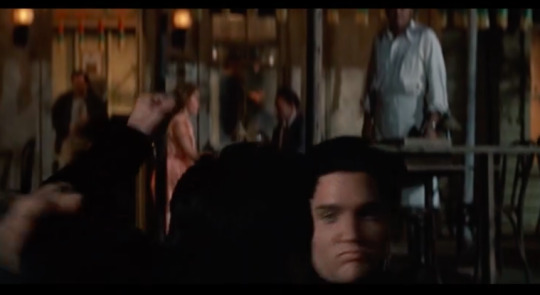
I'm not sure what to think when it comes to this fight. Cliff did strike first but given what we find out about his health in the movie, it's hard to tell if he's a strong opponent. Glenn did technically win and killed Cliff. The problem's that Cliff's health was not as good as originally believed. I don't think that would give Glenn that many "points" in strength of opponent.
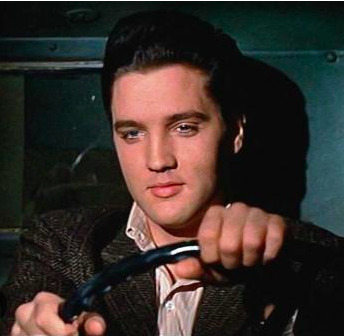
Glenn does have promise as a fighter. The problem's that he's a hot head and benefits from opponents that are impaired. He is scrappy but I really doubt his skill if he was to face an opponent around his age that's able to fight at their full strength.
Because of his lack of professional experience and having two wins, I'm putting Glenn in B tier. He might be able to win a street fight, but I don't see him winning against a professional fighter.
Tagging: Thank you @xanatenshi and @arrolyn1114 for your input on Glenn's rank.
AN: Expect the announcement for my next film review on February 1st.
#elvis fandom#elvis presley#glenn tyler#wild in the country#kung fu elvis tidbit#elvis film#elvis tier list
11 notes
·
View notes